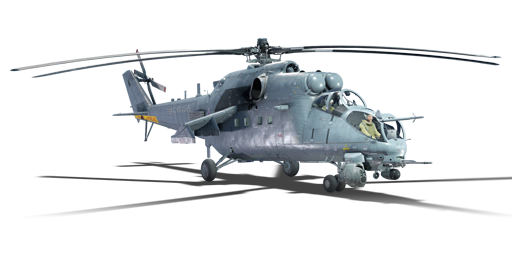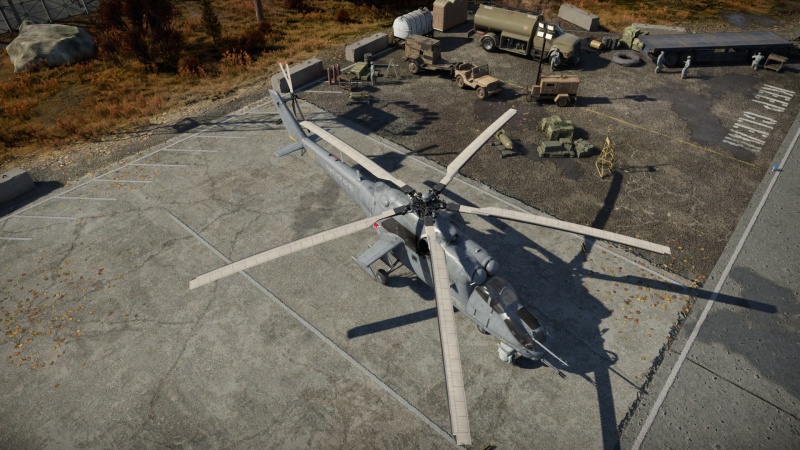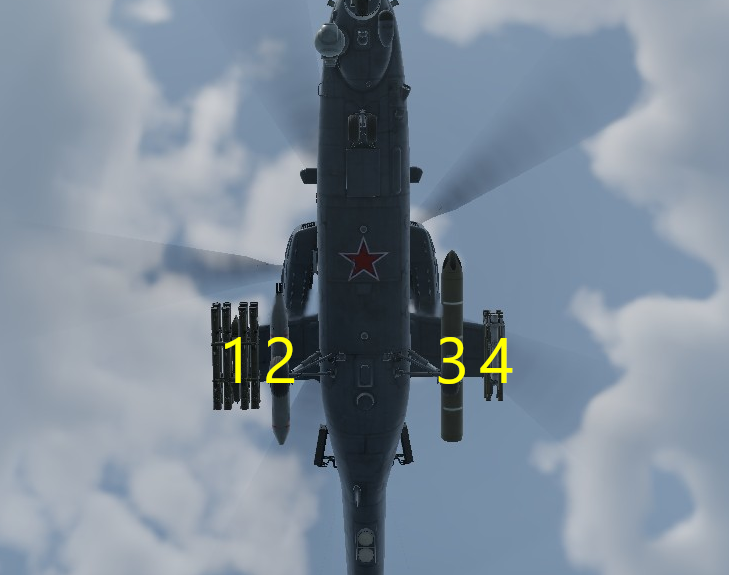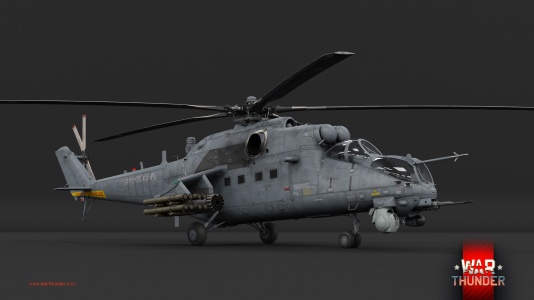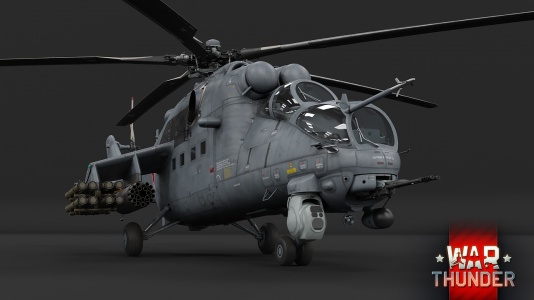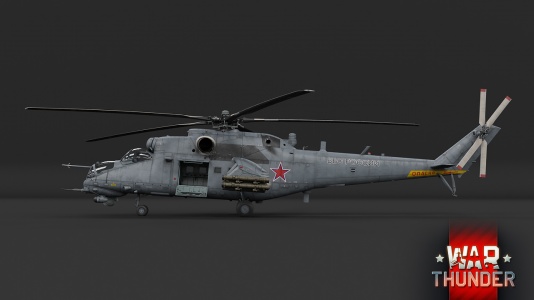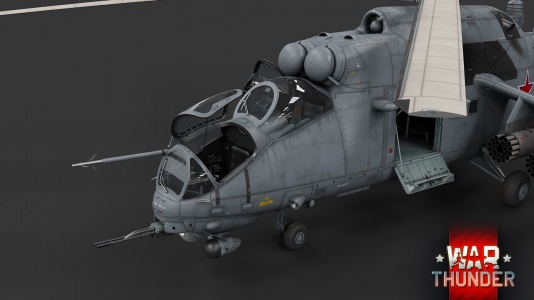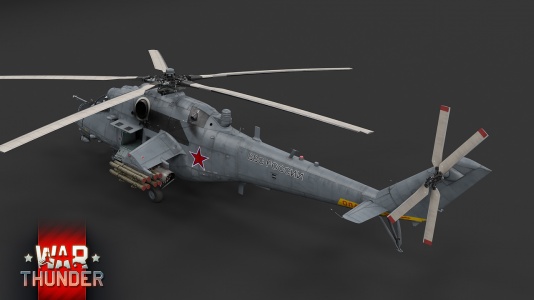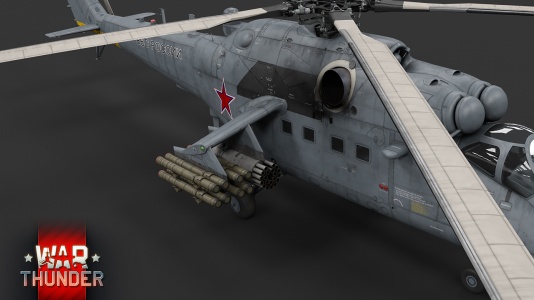Difference between revisions of "Mi-35M"
(→Suspended armament: Updated) |
(→Description) |
||
| (One intermediate revision by one other user not shown) | |||
| Line 14: | Line 14: | ||
== Description == | == Description == | ||
<!-- ''In the description, the first part should be about the history of and the creation and combat usage of the helicopter, as well as its key features. In the second part, tell the reader about the helicopter in the game. Insert a screenshot of the vehicle, so that if the novice player does not remember the vehicle by name, he will immediately understand what kind of vehicle the article is talking about.'' --> | <!-- ''In the description, the first part should be about the history of and the creation and combat usage of the helicopter, as well as its key features. In the second part, tell the reader about the helicopter in the game. Insert a screenshot of the vehicle, so that if the novice player does not remember the vehicle by name, he will immediately understand what kind of vehicle the article is talking about.'' --> | ||
| − | + | After the fall of the Soviet Union, a program was initiated to modernize previous Mi-24 helicopters for use by the Russian Federation, as they were on a tight budget and could not build the complete amount of Mi-28 and Ka-50 helicopters to replace the Hind fleet as initially proposed. The upgrade program would completely overhaul the helicopter both inside and out, by incorporating on-board fire control computers, anti-jam communication equipment, overhauled "glass cockpit" with color MFDs, and a GLONASS/GPS navigation system. The weaponry was also upgraded, with the ability to use the new [[9M120 Ataka]] ATGMs, Igla IR missiles for self-defence against aircraft, and a variety of new unguided rocket pods. These were all aimed with the brand new GOES-342 electro-optical rangefinder/targeting system and its respective thermal sight. Finally, the 12.7 mm turret in the nose was replaced with a [[GSh-23-2 (23 mm)|GSh-23-2]] turret for more firepower. For defence, the Mi-35M was equipped with the latest defensive measures, including the Vitebsk Onboard Defence System composed of a Missile Approach Warning system, multiple countermeasure dispensers, and a basic electronic IRCM suite. Modernization to the Mi-35M standard would start quickly after it passed state trials, and as of 2018, more than 60 of the type are in Russian service. | |
| − | The | + | The '''{{Specs|name}}''' "Super Hind" (NATO reporting name: ''Hind-J''), introduced in [[Update 1.81 "The Valkyries"]], is the epitome of the Hind family. Being a heavily modernized variant for the 21st century, the Mi-35M incorporates many of the features of top tier helicopters on the versatile and familiar Mi-24 Hind chassis. By incorporating such advanced systems on a tried and true airframe, players have the chance to focus on learning all about these new systems and how to use them, without paying much attention to trying to fly a new kind of airframe, as players will have already familiarized themselves with the flight performance of the previous Hinds. Thanks to the many upgrades in guided weaponry and targeting systems, the Mi-35M is a much more capable tank hunter overall at its battle rating and can easily support its high-tier Soviet MBT peers. |
== General info == | == General info == | ||
| Line 109: | Line 109: | ||
{{Navigation-Start|Default weapon presets}} | {{Navigation-Start|Default weapon presets}} | ||
{{Navigation-First-Simple-Line}} | {{Navigation-First-Simple-Line}} | ||
| + | |||
* Without load | * Without load | ||
* 8 x 9M39 Igla missiles | * 8 x 9M39 Igla missiles | ||
Latest revision as of 22:46, 25 October 2023
| This page is about the Russian attack helicopter Mi-35M. For April Fools event helicopter, see Mi-35 (April Fools). For other versions, see Mi-24 (Family). |
Contents
Description
After the fall of the Soviet Union, a program was initiated to modernize previous Mi-24 helicopters for use by the Russian Federation, as they were on a tight budget and could not build the complete amount of Mi-28 and Ka-50 helicopters to replace the Hind fleet as initially proposed. The upgrade program would completely overhaul the helicopter both inside and out, by incorporating on-board fire control computers, anti-jam communication equipment, overhauled "glass cockpit" with color MFDs, and a GLONASS/GPS navigation system. The weaponry was also upgraded, with the ability to use the new 9M120 Ataka ATGMs, Igla IR missiles for self-defence against aircraft, and a variety of new unguided rocket pods. These were all aimed with the brand new GOES-342 electro-optical rangefinder/targeting system and its respective thermal sight. Finally, the 12.7 mm turret in the nose was replaced with a GSh-23-2 turret for more firepower. For defence, the Mi-35M was equipped with the latest defensive measures, including the Vitebsk Onboard Defence System composed of a Missile Approach Warning system, multiple countermeasure dispensers, and a basic electronic IRCM suite. Modernization to the Mi-35M standard would start quickly after it passed state trials, and as of 2018, more than 60 of the type are in Russian service.
The Mi-35M "Super Hind" (NATO reporting name: Hind-J), introduced in Update 1.81 "The Valkyries", is the epitome of the Hind family. Being a heavily modernized variant for the 21st century, the Mi-35M incorporates many of the features of top tier helicopters on the versatile and familiar Mi-24 Hind chassis. By incorporating such advanced systems on a tried and true airframe, players have the chance to focus on learning all about these new systems and how to use them, without paying much attention to trying to fly a new kind of airframe, as players will have already familiarized themselves with the flight performance of the previous Hinds. Thanks to the many upgrades in guided weaponry and targeting systems, the Mi-35M is a much more capable tank hunter overall at its battle rating and can easily support its high-tier Soviet MBT peers.
General info
Flight performance
| Characteristics | Max Speed (km/h at 1,000 m) |
Max altitude (metres) | |
|---|---|---|---|
| AB | RB | ||
| Stock | 275 | 259 | 5400 |
| Upgraded | 323 | 300 | |
Survivability and armour
The Mi-35M keeps the armour protection of the Hind family, with thick 55 mm bulletproof glass on the windscreens and steel plates of 8 mm and 4 mm thickness covering both the crew compartment and engines. While heavier and more primitive than the composite screens of modern attack helicopters, they help the Hind survive incoming fire and explosive shrapnel.
Modifications and economy
Armaments
| Ballistic Computer | ||
|---|---|---|
| CCIP (Guns) | CCIP (Rockets) | CCIP (Bombs) |
| |
|
|
Offensive armament
The Mi-35M is armed with:
- A choice between four presets:
- 1 x 23 mm GSh-23L cannon (450 rpg)
- 1 x 23 mm GSh-23L cannon + HIRSS
- 1 x 23 mm GSh-23L cannon + HIRSS + 192 x countermeasures
- 1 x 23 mm GSh-23L cannon + HIRSS + 192 x countermeasures + IRCM
The turreted GSh-23L cannon packs a significantly greater punch per shot than the Mi-24V's Yak-B gatling machine gun, even though it has a slower muzzle velocity and rate of fire. It's not as powerful as the Mi-24P's fixed GSh-30-2 cannon and should not really be used for tank hunting, but it's good for fighting incoming aircraft. The auto-tracker can also automatically calculate gun lead, which makes it very convenient to use.
Suspended armament
The Mi-35M can be outfitted with the following ordnance:
| 1 | 2 | 3 | 4 | ||
|---|---|---|---|---|---|
| 23 mm GSh-23L cannons (250 rpg) | 1 | 1 | |||
| S-8KO rockets | 20 | 20 | 20 | 20 | |
| S-13OF rockets | 5 | 5 | |||
| 9M39 Igla missiles | 4 | 4 | |||
| 9M114 Shturm missiles | 2, 4, 8 | ||||
| 9M120 Ataka missiles | 4, 8 | ||||
| Maximum permissible weight imbalance: 500 kg | |||||
| Default weapon presets | |
|---|---|
| |
The Mi-35M's loadout has been simplified compared to earlier Hinds. Two types of rockets are available, the returning S-8KO HEAT rockets and the new S-13OF HE rockets. The S-13OF is individually less powerful than the bunker-busting S-24s, but it comes in pods of 5 and can still knock out light targets easily.
The only air-to-air missile is the 9M39 Igla MANPADS, which compared to the R-60M has a better seeker (improved acquisition range and flare resistance), better capacity (up to 8 vs up to 4) but much worse manoeuvrability (10 G overload vs 30 G). The Iglas perform better against helicopters, which have limited dodging capabilities but lots of flares to compensate, but significantly worse against jet fighters, so the Mi-35M is somewhat less capable in the air superiority role.
The 9M114 Shturm missile returns as the stock ATGM option but its 560 mm of single-charge penetration is very lacking at the Mi-35M's rank and it will not do much against MBTs. The 9M120 Ataka is an improved development of the Shturm with 800 mm of tandem-charge penetration and an extra kilometre of range for 6 km total; the Ataka can threaten at least the front hull of most MBTs and is much more viable, although its range lags behind the Hellfire available to NATO helicopters.
Lastly, GSh-23L cannon pods return, but they are not very practical. The Mi-35M's internal GSh-23L with an auto-tracker is both equally powerful and much more accurate.
The Mi-35M only has four hardpoints, compared to the six of previous Hinds, but this does not degrade its ability to carry ATGMs and AAMs. The outboard right pylon is the only one capable of mounting ATGMs, and up to 8 can be carried. It can mount 4 Iglas as well but this is not recommended unless there are insufficient spawn points for ATGMs. The outboard left pylon on the other side can be used to carry 4 Iglas instead, which is sufficient for most battles. So the overall missile capacity is superior to the earlier Mi-24V/P Hinds, which could only carry 8 ATGMs by sacrificing all AAMs.
Usage in battles
The Mi-35M is the best Hind for tank hunting because of its thermal sights, auto-tracker, and improved Ataka ATGMs, which let it keep up with the pace of high tier combat where targets move quickly and have strong protection. Unfortunately the Hind airframe starts to show its age at its rank, because its limited agility and huge profile make it difficult to avoid detection and dodge incoming SAMs. The 6 km range of the Atakas is less than radar-guided SAMs like the Roland 1 and the Mi-35M may not always win a missile joust. It still helps to use the Hind's speed to circle around the battlefield and attack from angles that the enemy team would not normally expect helicopters from.
Iglas are reasonably effective against helicopters due to their effective seeker and countermeasure resistance, but in the presence of HIRSS or IRCM systems, they may be outranged by the Atakas. By using the auto-tracker, the Atakas are in fact capable anti-helicopter missiles considering their high flight speed. Jet aircraft are usually too fast for the Atakas to track unless they are slow and not paying attention, so the Mi-35M should generally avoid enemy aircraft and only engage them in self defence or when they are unaware. An enemy attacker pulling up after a weapons launch is a good target for an Igla.
Pros and cons
Pros:
- Ataka missiles are fast, making them easy to use and aim
- Great 23 mm cannon damage
- IRCM and flares help the Mi-35M avoid AAMs
- Igla AAMs are flare and IRCM resistant, good against unaware enemy jets
Cons:
- Relatively low ammo reserve on the 23 mm cannons
- Lower top speed than the Mi-24s
History
The Mi-35M is a modern utility combat helicopter of the Russian army, manufactured by Rostvertol helicopter company. At the moment, the Mi-35M is the most modern modification of the Mi-24 series. During its versatile service in Afghanistan, India, and other locations, the "Hind" performed well but had few vital flaws. A modernized version, titled Mi-35, underwent specific improvements. The helicopter gained new more powerful engines, the metal rotor was replaced by a composite one, the 3-bladed anti-torque rotor was replaced by an X-shaped composite one. The Mi-35M was given fixed landing gear and new shorter wings with only four weaponry mounting points. The weapon itself has also been updated: A 4-barreled 50.cal machine gun in the chin-mounted rotating turret is now replaced by a twin-barreled 23-mm GSh-23L autocannon. Mounted weaponry now consists of two types of ATGMs, modern air-to-ground unguided rockets, 23mm cannon pods, and other changes. The Mi-35M is currently in service in the Russian Air Forces, and other nations. Russian and Iraqi Mi-35M-s fought in recent actions in Syria.
- From Devblog
Media
- Skins
- Images
- Videos
See also
Links to the articles on the War Thunder Wiki that you think will be useful for the reader, for example:
- reference to the series of the helicopter;
- links to approximate analogues of other nations and research trees.
External links
| Mil Moscow Helicopter Plant | |
|---|---|
| Attack | Mi-4AV |
| Mi-8AMTSh · Mi-8AMTSh-VN · Mi-8TV | |
| Mi-24A · Mi-24P · Mi-24V | |
| Mi-28N · Mi-28NM | |
| Mi-35M | |
| Export | ◊Mi-8TB |
| ▂Mi-24D · ◔Mi-24D · ◔Mi-24V · ◔Mi-24P · ◊Mi-24P · ◄Mi-24P HFS 80 · Superhind | |
| Mi-28A | |
| ▄Mi-35M | |
| USSR helicopters | |
|---|---|
| Attack | |
| Hound | Mi-4AV |
| Hip | Mi-8AMTSh · Mi-8AMTSh-VN · Mi-8TV |
| Hind | Mi-24A · ▂Mi-24D · Mi-24P · Mi-24V · Mi-35M |
| Havoc | Mi-28N · Mi-28NM |
| Helix | Ka-29 |
| Hokum | Ka-50 · Ka-52 |


